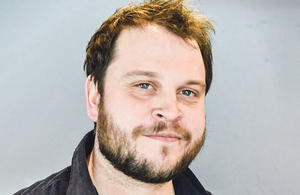Guest Blog: Barney Norris On The Ethics of Telling And What He Loves About The World
Writer and Director Barney Norris talks about his new work, including his play at the Arcola Theatre

This year I've thought a lot about the ethics of telling. This is a subject with wide implications. It's about 'telling on' other kids in the playground; it's about 'grassing' on criminality; it's about the impact of speech and the way telling a story is a way of giving attention to something. But also, always, it's about drawing attention away from a myriad of other things. And for me, this year, it's been about how much I'm willing to annoy my parents in order to express the things I want to say to the world.
I'm in the process of trying to express what I love about the world through a series of autobiographical or authographic works: The Wellspring, which is written and performed with my father; Undercurrent, my fourth novel, published this August; and my first original, sole-authored play in four years, We Started To Sing, which is the story of my family told across the last thirty-odd years - the period during which I've shared their lives.
I embarked on this project after long consideration, because the majority of characters in the play are living people - my Mum, my Dad and my step-dad. To write about living people without changing their names happens all the time, of course - newspapers, history, biography, etc - but it's slightly less common in artistic work.
I was spurred into it by discovering Laurie Lee, and the vivid love of life accessed in his books through the evocation of real, lived experience, which was like nothing else I'd ever encountered in storytelling. I felt his books as deeply as I'd ever felt anything, and I think the truth in them is part of that.
However, true stories are vulnerable things to tell. Colm Toibin says you just have to publish and be damned: if you've written a story about your aunt, you have to call her and say, I'm very sorry, I've written a story about you and it's in the paper this weekend. But it is more complex than that.
Carole Cadwalladr has led the recent debate over whether it's right to make plays and films about people like Dominic Cummings or Donald Trump, before the full scope of Russian influence in the elections they're associated with has come to light. At first, I disagreed with her resistance to this - would she have told Solzhenitsyn it was too soon? But of course, most writers aren't Solzhenitsyn, and so, as the war in Ukraine has expanded, I've started to think she had a point.
I've worked with artists who felt that, when writing about real people, nothing should be said without the subject's permission. I feel instinctively resistant to the rigid application of this idea. Partly because it's an anti-free speech position, which is therefore an anti-democratic position, and those aren't my politics; and partly because I think it's a severe misunderstanding of the mechanics of telling. It assumes that what an artist says is the same as what an audience hears, and that just isn't the case.
%20Alex%20Brenner%2C%20We%20Started%20To%20Sing%20(rehearsal)%2C%20Barney%20Norris%2C%20Barbara%20Flynn%2C%20Robin%20Soans%2C%20David%20Ricardo-Pearce.jpg)
Photo Credit: Marc Brenner
An artist can curate the meaning of their work with more or less skill, but ultimately, meaning is in the eye of the beholder, and is personal and unique to every audience member who engages with a story. The permission of a subject to say something about them doesn't offer any guarantee of how the audience will receive what is said on any given night.
It's this, in the end, which has led me to tell the stories I'm telling this year. I could avoid saying anything about my family for fear of offending them; and then one day the stories they told, which were their lives, will vanish entirely from the world. Of course, that's likely to happen one day anyway - it's likely to happen to almost everyone. But to love someone is to want them to live, and so I have resolved this year to try and tell my family's stories, in order that they'll sing out in the world that little bit louder.
We Started To Sing is at the Arcola Theatre until 18th June
Comments

Videos

